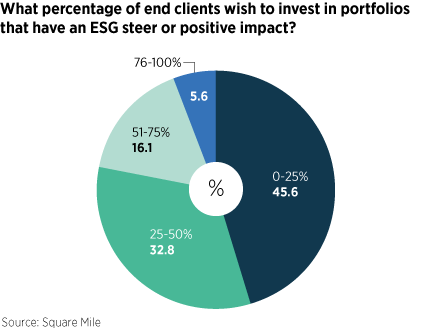Research from Square Mile Investment Consulting and Research has concluded considerable educational work needs to be carried out in the adviser community as nearly half of those surveyed at its events were unaware of mandatory Mifid II changes that determine ESG needs to be part of their suitability processes.
Similarly, advisers indicated asset managers could better support their understanding of ESG by improving clarity of their materials and processes, as well as offering more education on the topic.
In research made exclusively available to Portfolio Adviser sister title ESG Clarity, Square Mile surveyed advisers over the course of Q1 2020 at 21 events attended by Personal Finance Society members. Of the 184 that responded, it is clear the IFA community is still getting to grips with ESG terminology, methodology and a potential change in client attitudes towards responsible investing as society embarks upon a generational wealth transfer from baby boomers to millennials.
Advisers said currently there are a limited number of clients that view ESG as an important consideration in portfolios: only 22% of respondents said more than half of their clients would wish to be invested in a portfolio with an ESG steer or positive impact. Furthermore, 78% of advisers indicated that fewer than 50% of their clients would wish to invest in an ESG-oriented portfolio, and 46% claimed that less than 25% of their clients would wish to do so.

More worryingly, 54% of advisers stated they do not already ask a question specifically around the theme of ESG in their Attitude to Risk Questionnaires (ATRQ) and only 7% said they covered this in their fact find. Additionally, some 47% of advisers said they were unaware of the upcoming regulatory changes.
The Square Mile report said: “With regulation inbound in H1 2021 that will require advisers to establish their clients’ ESG needs, this will need to change fast. Moreover, this highlights the general lack of information clients are being provided in the area of ESG by many advisers and could indicate there being significant room for development of ESG in the market where clients are made more aware of it.”
Meanwhile, only just over a third of advisers have integrated ESG into their centralised investment proposition (CIP) but Square Mile said this reflects the “still modest” number of ESG funds and number of asset managers who have a “clearly articulated proposition on how ESG is integrated into their processes”.
“It could also be indicative of a lack of information and knowledge on the part of advisers that they do not feel they have the sufficient tools to make their CIP more ESG friendly as yet,” the report added.
Most advisers feel comfortable with ESG terminology
Interestingly, 63% of advisers said they were comfortable with terminology around ESG investing, and indicated there is still a need for a common language within the industry and more support from the wider industry.
Steve Kenny (pictured), commercial director at Square Mile, told ESG Clarity: “This survey highlights the general practitioner IFA community is still struggling to get its head around responsible investing. We have investment commentators using the words ‘ESG’, ‘responsible’, sustainable’, and ‘impact’ interchangeably when they are not the same. There is a lot of misinformation in the marketplace and groups are using all sorts of different terms.”
> See also: John Monaghan: The need for clarity in ESG and responsible investing
The report added that when advisers were asked about the kind of support they would like to see from asset managers, a fifth said more consistent use of language would allow them to compare and contrast funds and fund groups more easily.
Advisers flagged need for greater education through literature and events, as well as podcasts, ESG scores in factsheets, risk tolerance information and greater accessibility.

When advisers were asked for the kind of support they would like specifically to the impending regulations, 47% said they feel they would benefit from more education on ESG matters, with 27% indicating through guidance and coaching, 10% through seminars and 7% through literature.
Engage: ESG Clarity‘s inaugural live Q&A Twitter session with UN PRI CEO Fiona Reynolds
The report added: “Another clear theme, once again, is around clarity. A combined total of 44% of advisers voted for the standardisation of terms (21%), simplification of language (10%), ESG ratings (8%), client friendly information (4%) and for the need for the industry to stop greenwashing (1%). This clearly highlights the desire that advisers must be more easily able to assess fund information, compare them and relay that information on to clients. Many seek more objective, jargon-free and unambiguous presentation from asset managers or other industry professionals.”
Kenny commented: “We would not be helping ourselves as an industry by not addressing this. The research shows clients are ambivalent and IFAs don’t understand a lot around the ESG theme and that is a worry. Soon they will have to advise on it – how can they do that in an informed way?
“Groups need to provide clear and sensible information and language as well as their direction of travel on ESG.
“This is going to be the ‘new normal’ for investors, it is a reflection of societal changes.”
> See also: IA reaches milestone £5trn consensus on responsible investment terms
Accepting sacrifice of degree of underperformance
Meanwhile, Square Mile also explored what percentage of the advisers’ client bases would consider it acceptable to sacrifice some degree of performance in return for a portfolio that delivers ESG compatible results.
Just over 80% of respondents, said less than 25% of their clients would be willing to do so, and only 2% advisers out of the entire group believe that more than half of their clients would be happy to make this choice.
When asked about higher charges for ESG outcomes, only 8% of advisers believe that more than 50% of their clients would be prepared to do so, and more than two thirds of advisers (69%) think than just 0 to 25% of their clients would be willing to pay a higher cost if they were to consider an ESG portfolio.
“However,” the report added, “advisers do contest that performance and cost need not be different, and that clients might not be asking to invest in ESG portfolios because they do not know about them. New legislation in H1 2021 requiring advisers to determine the client’s ESG needs may change this, as it will force clients and advisers alike to consider this area.”
Kenny said: “The perspective that advisers feel that there is insufficient client demand for strategies which incorporate ESG is undoubtedly influenced by the fact that a significant number of advisers do not raise the subject with them. Indeed, the traditional view was that investors faced a binary decision: choose an ESG strategy or choose performance.
“This has been proven wrong and the evidence is there for all to see in the first four months of 2020. The strong returns produced by many ESG funds over this period demonstrate that this is no longer the case. At the same time, it is clear that many advisers are not determining interest in ESG as part of their suitability assessments. It is particularly concerning that nearly half of those responding are unaware of imminent regulatory change that will compel them to do so.”
> See also: Square Mile aims to cut through confusion with ESG ratings
For more insight on ESG investing, please visit www.esgclarity.com










